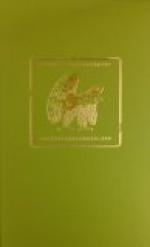“The tracks led me up the rough path towards the cabin, but midway I came to a fallen tree. It must have been down a week or more, but no attempt had been made to clear the trail or to cut through, so, pushing up over the matted boughs, I leaped from the bole to avoid the litter beyond. At the same instant I saw under me, wedged in the broken branches, the body of my bear. He was a huge grizzly, and must have made an easy and ugly target as he lumbered across the barricade. I found one bullet had taken him nearly between the eyes, while another had lodged in the shoulder. And it was plain the shots were aimed from the window, with the rifle probably resting on the sill.
“As I went on up the path, the loud baying of a dog came from the cabin, then a woman’s face, young and small and very white, appeared at the window. Seeing me, she turned quickly and threw open the door. The next instant her hand fell to the neck of a fine Gordon setter and, tugging at his collar, she drew back and stood surveying me from head to foot. ’It’s all right, madam,’ I said, stopping before her. ’Don’t try to hold him. The bear won’t trouble you any more. You made a mighty fine shot.’
“‘Oh,’ she said, and let the dog go, ‘I am so glad you have come.’ And she sank into a chair, shaking and sobbing.”
“You mean,” exclaimed Miss Armitage breathlessly, “it was she who killed the bear?”
Tisdale nodded gently. “I wish I could make you understand the situation. She was not a sportswoman. She was city bred and had been carefully reared—accustomed to have things done for her. I saw this at a glance. Only her extremity and the fear that the dog would be hurt nerved her to shoot.”
“Oh, I see, I see,” said Miss Armitage. “Fate had brought her, left her in that solitary place—alone.”
“Fate?” Tisdale questioned. “Well, perhaps, but not maliciously; not in jest. On second thought I would not lay it to Fate at all. You see, she had come voluntarily, willingly, though blindly enough. She was one of the few women who are capable of a great love.”




